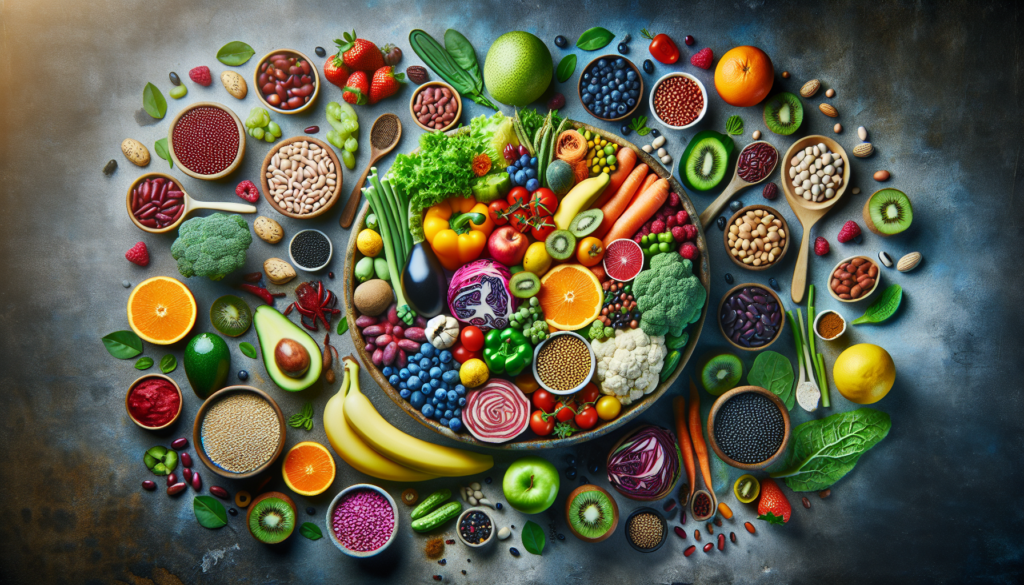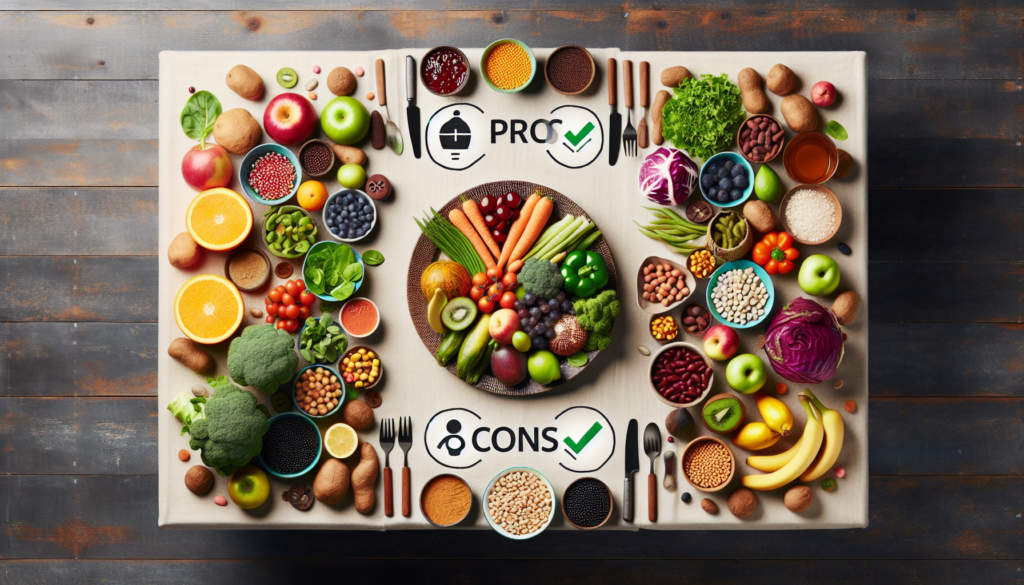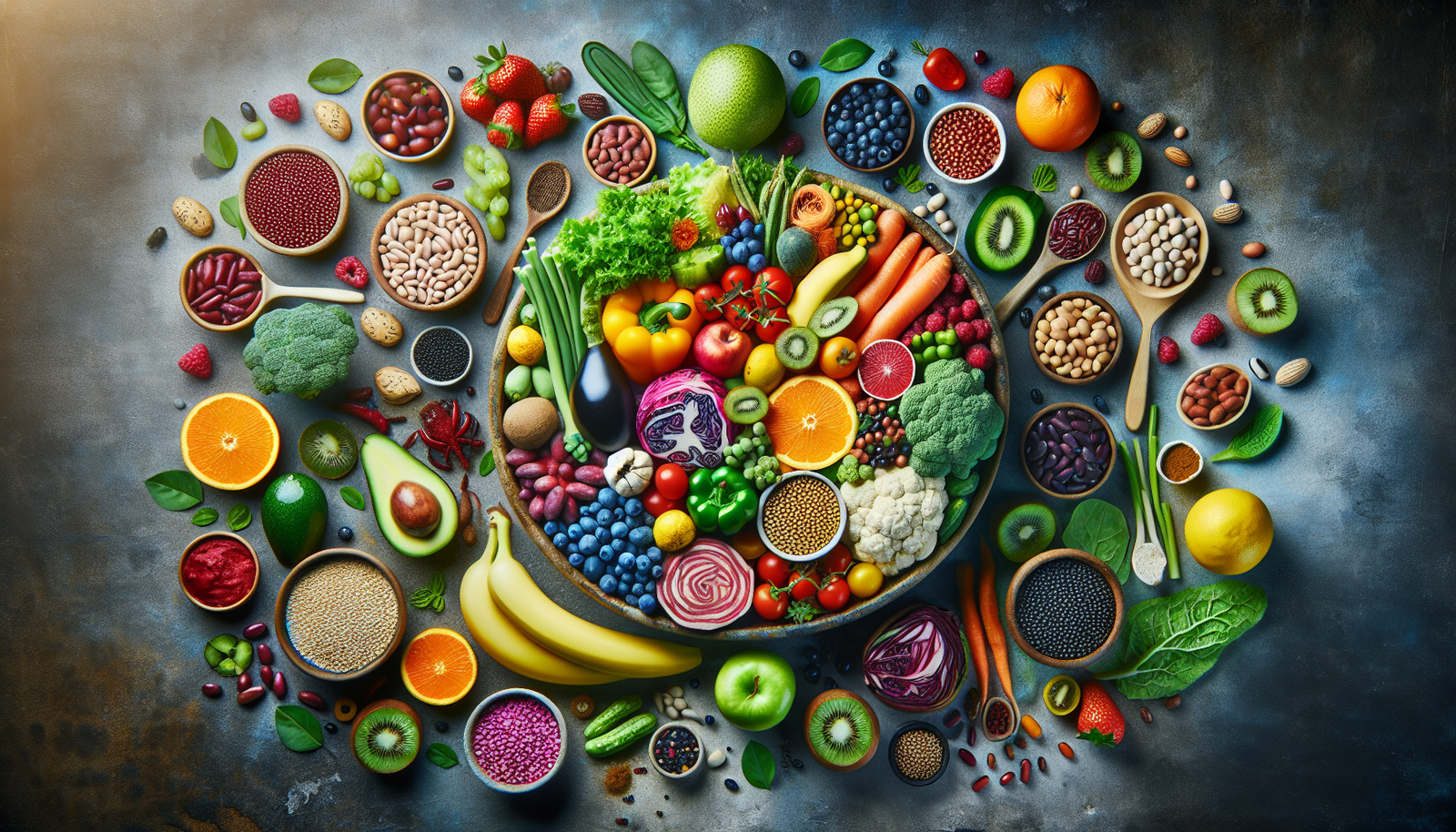Are you curious about the growing trend of plant-based diets and whether it might be a good fit for you? In this article, we will explore the pros and cons of adopting a plant-based diet and discuss the potential health benefits it offers. Whether you’re considering making the switch or simply interested in learning more, this article will provide you with valuable insights into the world of plant-based eating. So sit back, relax, and let’s delve into the exciting world of plant-based diets!

What is a plant-based diet?
A plant-based diet is a way of eating that focuses primarily on foods derived from plants. It includes fruits, vegetables, whole grains, legumes, nuts, and seeds. While it doesn’t prohibit the consumption of animal products entirely, the main emphasis is on plant foods. This type of diet can vary in strictness, with some individuals choosing to eliminate all animal products, while others may include small amounts of fish, eggs, or dairy.
Definition and principles of a plant-based diet
A plant-based diet is based on the principles of consuming a variety of whole, minimally processed foods that are derived from plants. It encourages the inclusion of fruits, vegetables, whole grains, legumes, nuts, and seeds in abundance, while limiting the intake of animal products. The emphasis is on eating foods that are high in nutrients, fiber, and antioxidants, while reducing the consumption of saturated fats and cholesterol.
Different types of plant-based diets
There are different types of plant-based diets that individuals can follow, depending on their preferences and health goals. Some common variants include:
-
Vegan: A vegan diet excludes all animal products, including meat, poultry, fish, eggs, dairy, and honey.
-
Vegetarian: A vegetarian diet eliminates meat and seafood but may include dairy products, eggs, and honey.
-
Pescatarian: A pescatarian diet includes plant foods along with fish and seafood but excludes meat and poultry.
-
Flexitarian: A flexitarian diet is primarily plant-based but allows for occasional consumption of meat and other animal products.
Pros of a plant-based diet
A plant-based diet offers several potential benefits, not only for personal health but also for the environment and animal welfare.
Health benefits of a plant-based diet
Adopting a plant-based diet can have numerous positive effects on your health:
-
Reduced risk of chronic diseases: Studies have shown that a plant-based diet is associated with a lower risk of heart disease, type 2 diabetes, certain types of cancer, and obesity.
-
Improved heart health: Plant-based diets tend to be low in saturated fats and cholesterol, which can contribute to improved heart health and a reduced risk of cardiovascular diseases.
-
Weight management: Focusing on whole, plant-based foods can help promote weight loss and weight management due to their high fiber content and lower calorie density.
-
Better digestion and gut health: Plant-based diets are typically rich in fiber, which promotes regular bowel movements, aids in digestion, and supports a healthy gut microbiome.
Environmental benefits of a plant-based diet
Plant-based diets have a significantly lower environmental impact compared to diets that rely heavily on animal products. Some of the environmental benefits of adopting a plant-based diet include:
-
Reduced greenhouse gas emissions: Animal agriculture contributes to a significant amount of greenhouse gas emissions, including carbon dioxide and methane. By reducing the consumption of animal products, you can help mitigate climate change.
-
Conservation of water resources: Producing animal-based foods requires a substantial amount of water. Shifting towards a plant-based diet can help conserve water resources, as plant foods generally have a lower water footprint.
-
Preservation of biodiversity: The production of animal-based foods often leads to deforestation and habitat destruction. By choosing plant-based options, you can help protect biodiversity and preserve natural habitats.
Animal welfare benefits of a plant-based diet
One of the ethical considerations of adopting a plant-based diet is the positive impact it has on animal welfare. By reducing or eliminating the consumption of animal products, you are supporting a more compassionate approach towards animals. Plant-based diets prioritize the well-being of animals and promote a more sustainable and humane food system.
Cons of a plant-based diet
While there are many benefits associated with a plant-based diet, it’s important to consider potential drawbacks as well.
Potential nutrient deficiencies in a plant-based diet
A plant-based diet, if not properly planned and balanced, may lead to certain nutrient deficiencies. It’s essential to ensure an adequate intake of nutrients such as vitamin B12, iron, calcium, omega-3 fatty acids, and zinc. These nutrients are found predominantly in animal-based foods, and while they can be obtained through plant-based sources, attention to proper supplementation or alternative food choices is necessary.
Social and cultural challenges of a plant-based diet
Adopting a plant-based diet can sometimes present social and cultural challenges. It may require changes in social outings, family gatherings, and dining experiences. Being the only person following a plant-based diet in a group can sometimes lead to a feeling of exclusion or difficulty finding suitable options. However, with proper planning, communication, and openness, these challenges can be addressed and navigated effectively.
Potential health benefits of a plant-based diet
Many scientific studies have highlighted the potential health benefits associated with adopting a plant-based diet.
Reduced risk of chronic diseases
Research consistently shows that a plant-based diet is associated with a reduced risk of chronic diseases such as heart disease, type 2 diabetes, and certain types of cancer. The abundance of antioxidants, vitamins, minerals, and fiber found in plant foods can provide protective effects against these diseases.
Improved heart health
A plant-based diet naturally tends to be low in saturated fats and cholesterol, both of which can contribute to heart disease. By reducing or eliminating animal products and focusing on plant-based options, you can lower your risk of developing cardiovascular diseases, improve blood pressure, and support overall heart health.
Weight management
Plant-based diets, particularly those high in whole, minimally processed foods, are naturally lower in calorie density and higher in fiber, which can aid in weight management. The high fiber content in plant foods helps promote satiety, reducing the chances of overeating and promoting a healthy weight.
Better digestion and gut health
The fiber-rich nature of plant-based diets can support optimal digestive function and gut health. Adequate fiber intake can help prevent constipation, promote regular bowel movements, and create a favorable environment for a diverse and healthy gut microbiome.

What to include in a plant-based diet
A balanced plant-based diet should include a variety of nutrient-dense foods to ensure the intake of all essential nutrients:
Fruits and vegetables
The foundation of a plant-based diet should include a wide variety of fruits and vegetables. Aim for a rainbow of colors to ensure a diverse range of phytonutrients and antioxidants, which provide numerous health benefits.
Whole grains
Incorporate whole grains such as brown rice, quinoa, oats, and whole wheat products into your diet. These provide essential carbohydrates, fiber, B vitamins, and minerals.
Legumes
Legumes like beans, lentils, and chickpeas are excellent sources of plant-based protein, fiber, and various vitamins and minerals. They can be enjoyed in soups, stews, salads, or as a protein-rich main dish.
Nuts and seeds
Nuts and seeds provide healthy fats, protein, and important micronutrients. Include a variety of nuts like almonds, walnuts, and seeds such as flaxseeds, chia seeds, and hemp seeds to enhance the nutritional profile of your meals.
Plant-based protein sources
Ensure adequate protein intake by including plant-based protein sources like tofu, tempeh, seitan, and plant-based protein powders. These options provide essential amino acids and can be incorporated into a variety of dishes.
Healthy fats
Include sources of healthy fats in your diet such as avocados, olives, and plant-based oils like olive oil and coconut oil. These provide essential fatty acids and fat-soluble vitamins.
Tips for transitioning to a plant-based diet
Transitioning to a plant-based diet can be a gradual and enjoyable process. Here are some tips to help you make a successful transition:
Gradual approach
Instead of making sudden changes, start by incorporating more plant-based meals into your diet and gradually reducing your consumption of animal products. This will allow your taste buds and body to adapt to new flavors and textures.
Experiment with different foods
Explore different recipes and experiment with new fruits, vegetables, grains, legumes, and plant-based protein sources. This can help make your meals more exciting and varied.
Meal planning and preparation
Plan your meals ahead of time and ensure you have a variety of plant-based ingredients available. Meal prepping can also save time during busy weekdays, making it easier to stick to your plant-based diet.
Seek support and education
Connect with others who follow a plant-based diet or join online communities for support and inspiration. Educate yourself on the nutritional aspects of a plant-based diet to ensure you meet your nutrient needs.
Stay hydrated
Remember to drink enough water throughout the day to stay hydrated, as water plays a vital role in overall health and well-being.
Addressing common concerns
Addressing any concerns or questions can help alleviate potential worries about a plant-based diet.
Meeting nutritional needs on a plant-based diet
With proper planning and attention to food choices, it is entirely possible to meet all nutritional needs on a plant-based diet. Ensuring a wide variety of fruits, vegetables, whole grains, legumes, nuts, and seeds will provide the necessary macros and micronutrients.
Ensuring adequate protein intake
Plant-based diets can easily meet protein needs by incorporating a variety of plant-based protein sources like legumes, tofu, tempeh, and seitan. Combining different sources throughout the day can provide all essential amino acids.
Getting enough iron and calcium
Plant-based sources of iron include leafy green vegetables, legumes, fortified cereals, and seeds. Calcium can be obtained from sources such as fortified plant-based milks, tofu, almonds, and leafy greens. Ensuring adequate intake and considering fortified options or supplements can help meet these needs.
Vitamin B12 supplementation
Vitamin B12 is primarily found in animal-based foods. For those following a plant-based diet, it is essential to supplement with B12 or consume fortified foods to meet the recommended intake.
Digestive changes
Transitioning to a plant-based diet may lead to changes in digestion, such as increased gas or bowel movements. These changes are usually temporary as your body adjusts to a higher fiber intake. Drinking plenty of water and gradually increasing fiber intake can help alleviate digestive discomfort.
Plant-based diet for different life stages
A plant-based diet can be appropriate for individuals at various life stages, provided that proper attention is given to meeting specific nutrient needs:
Plant-based diet during pregnancy and breastfeeding
A plant-based diet can be suitable during pregnancy and breastfeeding, but it requires careful planning to ensure adequate intake of essential nutrients such as iron, protein, calcium, omega-3 fatty acids, and vitamin B12. Consultation with a healthcare professional or registered dietitian is advisable to address specific needs.
Plant-based diet for infants and children
A plant-based diet can be appropriate for infants and children when well-planned and nutritionally balanced. Breastfeeding, appropriate supplementation, and consultation with a pediatrician or registered dietitian are essential to ensure optimal growth and development.
Plant-based diet for athletes and active individuals
Plant-based diets can provide more than enough nutrients to support athletic performance and recovery. Attention should be given to sufficient protein intake, calorie needs, and timing of meals to support muscle growth, repair, and energy levels.
Plant-based diet for older adults
A plant-based diet can be beneficial for older adults, as it provides essential nutrients for maintaining overall health. Adequate protein, calcium, vitamin D, and B12 intake should be ensured to support bone health, muscle strength, and overall well-being.
Conclusion
A plant-based diet offers a multitude of benefits for personal health, the environment, and animal welfare. By focusing on whole, plant-based foods and minimizing the consumption of animal products, individuals can improve their health by reducing the risk of chronic diseases, promoting heart health, managing weight, and supporting digestion. It’s important to plan meals carefully, ensuring adequate intake of essential nutrients and seeking support when needed. With a little guidance and exploration, embracing a plant-based diet can be a fulfilling journey towards a healthier, more sustainable lifestyle. So, why not start exploring the wonderful world of plant-based options today?

